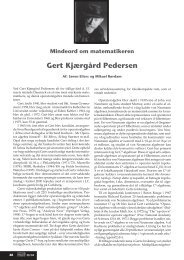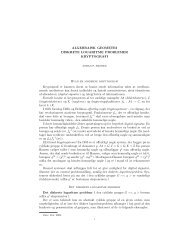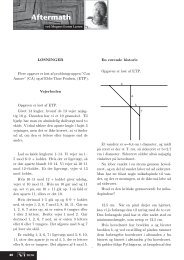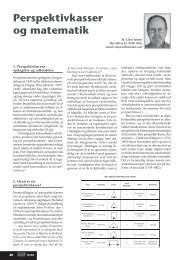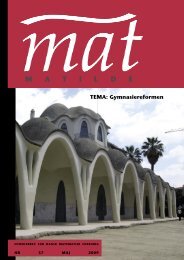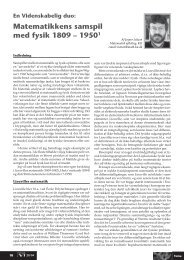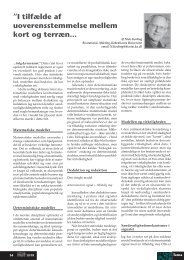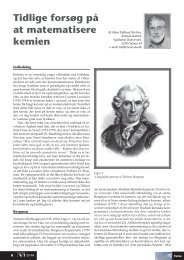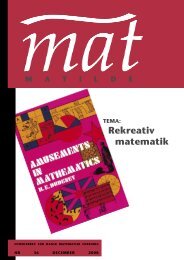MAT 15 - Matilde - Dansk Matematisk Forening
MAT 15 - Matilde - Dansk Matematisk Forening
MAT 15 - Matilde - Dansk Matematisk Forening
Create successful ePaper yourself
Turn your PDF publications into a flip-book with our unique Google optimized e-Paper software.
to intellectual ideas and concepts. Even as natural languages<br />
such as German or Chinese embody cultural treasures,<br />
mathematics does also. But one has to learn the<br />
“language” of mathematics to appreciate these treasures<br />
and to learn the history of mathematics to appreciate its<br />
growth within the history of general ideas.<br />
Looking about us, if we are perceptive, we can see not<br />
only the natural world of rocks, trees, and animals, but<br />
also the world of human artifacts and of human ideas.<br />
The ideas of Karl Marx (and of other thinkers) explain<br />
the world along certain lines, each necessarily limited, but<br />
these ideas have often changed the world beyond recognition.<br />
Mathematics also, is capable of explaining the world<br />
in remarkable but limited ways. It is capable of formatting<br />
our human lives in useful ways, and it is capable,<br />
again in a limited way, of allowing us to look into the<br />
future and to make prudential judgements. Every educated<br />
person should achieve some appreciation of the historical<br />
role that mathematics plays in civilization in order<br />
that the subject be given both intelligent support as<br />
well as intelligent resistance to its products.<br />
Q4. What have been the dominant trends?<br />
A4. First of all, the amount of new mathematical theories<br />
created since 1900 is enormous. During that time,<br />
mathematics has become more abstract and deeper than<br />
it was in the 19th Century. By this I do not mean that<br />
simple things such as arithmetic have to be viewed by<br />
the general public in a more abstract or deeper way than<br />
before, but that the conceptualization of old mathematics<br />
and the creation and applications of new mathematics<br />
by the professionals have had that character.<br />
Mathematical logic is now firmly on the scene as is<br />
set theory. A new and more abstract algebra has grown<br />
mightily and consolidated itself. Infinitary mathematics<br />
(i.e., the calculus and its elaborations) has grown by leaps<br />
and bounds, but has had increasingly, as opposed to<br />
the 19th Century, to share the stage with finitary mathematics.<br />
Geometry, which began in antiquity as visual and numerical<br />
(lengths, areas, volumes) moved into an abstract<br />
axiomatic/deductive mode and now embraces such studies<br />
as algebraic, combinatorial , and probabalistic geometry.<br />
A major trend since the late 1930’s is to view mathematics<br />
as the study of deductive structures. Mathematics<br />
has shared the structuralist point of view with numerous<br />
non-mathematical disciplines ranging from linguistics to<br />
anthropology to literary criticism.<br />
There is no doubt that the electronic digital computer<br />
which emerged in the middle 1940’s, and is in many ways<br />
a mathematical instrument, has changed our day to day<br />
life noticeably. The computer has revitalized or widened<br />
the scope and increased the power of a number of traditi-<br />
onal branches of mathematics. It has also created new<br />
branches of the subject, and all in all, has had a revolutionary<br />
effect throughout science and technology.<br />
Q5. Tell me about the “chipification” of mathematics.<br />
A5. A good fraction of the mathematics that affects our<br />
day-to-day life is now performed automatically. It is built<br />
into computer chips that are in our wristwatches, automobiles,<br />
cash registers, ATM’s, coffee machines, medical<br />
equipment, civil engineering equipment, word processors,<br />
electronic games, telephone and media equipment,<br />
military equipment, ID plastic... the list has become endless<br />
and the word “chips” and the idea of inserting them<br />
to do clever things has become commonplace.<br />
The mathematics in chips is hidden from view. The<br />
average person, though greatly affected by it, need pay<br />
no conscious attention to it as mathematics. This would<br />
be the job of a corps of experts who design, implement,<br />
monitor, repair, improve such systems. The “chipification<br />
of the world” is going forward at a dizzying rate. One<br />
of the disturbing side effects of this trend may very well<br />
be that in the near future Sally and Johnny will not have<br />
to add or read in the conventional way. Will this put us<br />
back several hundred years when literacy and numeracy<br />
were relatively rare achievements? Not at all. Modes of<br />
communication, interpretation and of social arrangements<br />
have changed in the past and will change in the future. It<br />
does not mean that they will disappear.<br />
Q6. Where are the centers where new mathematics is<br />
developed? Who is “hip?” A fan of good rock music<br />
knows where to go to hear it. Where would a math fan<br />
go these days?<br />
A6. There are mathematical centers in all the developed<br />
countries of the world. They are located in universities,<br />
governmental agencies, research hospitals, scientific, economic<br />
or social “think tanks”, industries. All of these centers<br />
tend to be organized into groups and tend to concentrate<br />
their research on very limited and specific problems.<br />
There are also many mathematical researchers<br />
who work independently and productively outside of<br />
groups.<br />
Depending on what sort of “mathematical music” you<br />
would like to hear, you would visit one of these groups<br />
or individuals. Although these groups exhibit a great deal<br />
of esprit de corps and self esteem, and can be influential<br />
beyond their own walls, there is, in my judgement,<br />
no single group that is predominates. And this diversity<br />
is a very good thing.<br />
Much more close to home, there are now websites that<br />
cater to every level of mathematical interest and engagement.<br />
20/04<br />
17



